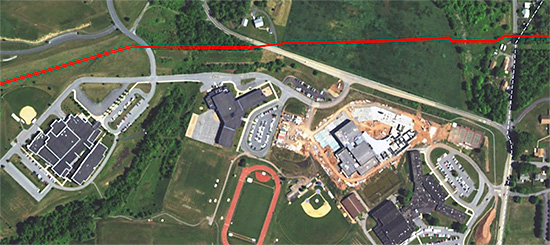Clean Air Council Leads on Protecting Pennsylvanians from Hazardous Liquid Pipelines

Chester County, PA (August 16, 2022) — Highly volatile hazardous liquids surge through the Mariner East pipeline system as it snakes through over 300 miles of Pennsylvania’s land. It passes by schools, under farms, and across streams. Existing lax regulations could not prevent Sunoco Pipeline L.P.’s reckless construction practices from creating sinkholes by homes and train tracks and contaminating residential water supplies, nor make Sunoco provide basic safety information to schools and communities in the zones threatened by potentially catastrophic leaks or explosions.
The Council, other local health and environmental groups, and impacted residents have worked tirelessly for years to protect the public and hold Sunoco accountable. We now applaud the Public Utility Commission (PUC) for stepping up with proposed common-sense rules to reduce the threat from hazardous liquid pipelines. Sunoco and other industry actors are trying to block the PUC’s proposed safety regulations, but the Council is meeting them at every turn, fighting Sunoco in court when local communities sue for relief, amplifying the voices of the public, and supporting the PUC’s invaluable efforts.
One of the most important proposed regulations would help prevent sinkholes and potential pipeline ruptures by requiring pipeline builders to look at the geology of a site before starting construction. Pennsylvania’s unique geology includes unstable limestone formations, called karst. These pipelines carry volatile gasses that are compressed under great pressure into liquid. If the pipelines rupture, heavier-than-air gasses would rapidly blanket the surrounding area, potentially suffocating anyone in range, and the slightest spark could ignite the highly flammable gasses. So, it seems obvious to avoid building where the ground might crumble away, leaving the pipeline unsupported. Yet Sunoco historically neglected to adequately check its construction sites, too often with disastrous results, and now fights this necessary rule.
The PUC also wants to require pipeline operators to provide local officials and emergency responders with the information they need to protect their communities in the event of an accident. The Council strongly supports providing all the information needed to local officials charged with protecting schools in the potential impact zone of a pipeline leak or other accidents. Previously, Sunoco provided such limited information to local community members that it left them quite unprepared for a pipeline disaster. For instance, the company left residents confused about when they should call “911” because a cell phone might produce a catastrophic spark.
The Legal Exposition
Buckle in for some legal exposition identifying what has happened and what still needs to happen before PUC’s proposed safety rules start protecting Pennsylvanians. Administrative regulations like these must go through several steps before being finalized, including opportunity for the public to submit comments. Here, the PUC decided to also invite a second round of comments to allow members of the public to respond to each others’ initial remarks. The rulemaking attracted comments from a wide range of interested parties, ranging from residents to local government officials to the American Petroleum Institute (the national trade association for the fossil fuel industry), and, of course, Sunoco.
In addition to raising public awareness during this process, the Council led a coalition of other knowledgeable public advocacy groups in drafting comments which (1) supported the PUC’s authority; (2) suggested ways to strengthen the proposed rules, including grounding the regulations in well established industry “best practices” which are too often ignored; and (3) bolstered the voices of local communities. In the second round, our coalition refuted the many baseless objections raised by Sunoco and their allies and provided further support for the concerns of local governments and nearby residents.
The comments and the proposed rules were then reviewed by Pennsylvania’s Independent Regulatory Review Commission (IRCC), as is standard. IRCC then prepared its own comments, referencing public comments and asking the PUC to conduct additional analysis.
What are the next steps
PUC must consider and publish a response to all of the comments before drafting a final form of the rules which it needs to send back to the IRCC. The PUC has two years from when the public comment period closed to complete the process, which makes the deadline May 12, 2024. IRCC will then discuss the rules at a public hearing and vote on whether the rules are “in the public interest.”
In the meantime, Clean Air Council will be part of the bulwark protecting the communities that brought successful challenges to some Sunoco’s harmful practices. Sunoco’s legal challenges to the PUC’s orders that resulted, combined with their public comments to the rulemaking, foreshadow their likely future judicial challenges to the safety rules. For instance, Pennsylvania law charges the PUC with ensuring that public utilities are operated safely and efficiently, making “every reasonable effort to warn and protect the public” from potential dangers. Sunoco argued strenuously for public utility status for its hazardous liquid pipelines because that allowed it to use the power of eminent domain to condemn private property to build its pipelines. Now it argues in public comments and in court that it should not need to accept the associated responsibilities. Astoundingly, in fighting these regulations Sunoco is essentially claiming that, in the event of a Sunoco-created pipeline emergency, it would be an unreasonable effort for Sunoco to 1) warn the officials in charge of keeping nearby school children safe, and 2) provide basic information public officials need to develop emergency-response plans to protect the children and others.
Clean Air Council will not let such claims stand. The Council will continue to fight Sunoco’s obstructionist, irresponsible behavior in court and through the regulatory process. It looks forward to reporting when the PUC’s new regulations are finalized and begin making Pennsylvania safer.
For more information, contact Annie Fox, Law Clerk at afox@cleanair.org.

